WARNING: Photos may be disturbing to some viewers.
October is one of my favorite months of the year because it's our school break for the whole month (YAY! Teachers need to recharge too!) and of course there's time to slow down, travel and learn more about the people, culture and traditions wherever you are in the world.
This month, my parents and my sister are visiting from the Philippines for a week. I have been looking forward to exposing them to the 'Phuket scenes' and one of those is the very interesting "Phuket Vegetarian Festival" which is celebrated from 29 September-7 October this 2019. During this period, vegetarian food are sold everywhere and the devotees abstain from eating all kinds of meat and alcohol consumption for 'cleansing the body, mind and spirit', and then there are the rituals and the processions.
When I was living in Penang Island, Malaysia a few years back, I knew about the 'vegetarian festival' but how they celebrate it here in Phuket, Thailand is very different. Practices and rituals are more similar to 'Thaipusam' festival in Georgetown but in my opinion, the 'gore' factor is so much more in Phuket. Hardcore. The prayers, rituals leading to 'possession', self-mutilation through piercings and cuttings...it's quite bloody and can be terrifying for people who do not like to see fresh human blood or practices that make one shudder (like tongues being deliberately cut by sharp axes *cringe*). It certainly can be scary for children too.
As I watched the procession of the 'possessed' individuals blessing the people, the houses, shops, and roads they were passing by while firecrackers were being thrown everywhere, I wondered - why? I asked some of the locals and they told me it's part of the 'tradition'...but still - "WHY?" It would be interesting to find out the origins of this practice.
Thank God, there is internet! So here's what I've gathered and rephrased to summarize so far what it is about. For the rest of where this text came from, click here.
The Vegetarian Festival or the Nine Emperor Gods Festival
The Nine Emperor Gods are high-ranking Star Lords who preside over the movement of planets and coordinate mortal Life and Death issues. Celebration of The Nine Emperors is formed by the seven stars of the Big Dipper of the North Ursa Major (visible) and two assistant stars (invisible to most people).
On the eve of the ninth moon, temples of the deities hold a ceremony to invoke and welcome the nine emperors. Since the arrival of the gods is believed to be through the waterways, processions are held from temples to the sea shore or river to symbolize this belief. Devotees dressed in traditional white, carrying incense and candles, await the arrival of their excellencies.

In Thailand, this festival is called thetsakan kin che (Thai: เทศกาลกินเจ), the Vegetarian Festival. It is celebrated throughout the entire country, but the festivities are at their height in Phuket, where over the half of the population is Peranakans. *I did a Peranakan-themed shoot in my previous post.*
Many religious devotees will perform ritualized mutilation upon themselves and one another while under a trance-like state, including but not limited to: impaling through cheeks, arms, face, legs, back etc., with everything from as small as syringes to as large as is agreed upon between all members; partial skinning (the skin is not removed, just cut and flipped over); slashing of limbs, chest, stomach and especially tongue with swords, axes and knives; bloodletting; removal of tissue (normally limited to cysts) and intentionally wrapping or standing near fire crackers as they are lit. This is done without anesthetic, always inside or near the temples surrounded by other devotees with only iodine, petroleum jelly and surgical gloves as precautionary measures.

*Slideshow below: click right to see the next image*
07 Oct. -Phuket Old Town, Thailand. Vegetarian Festival Procession - © jerraleen balais
The purpose of this practice is a mixture of veneration for their gods and ancestors, to display their devotion to their beliefs and the trance itself, which has a profound impact upon demeanour for days or weeks after, frequently with devotees appearing exceptionally calm and focused in their day-to-day activities after the festival is completed.
According to an early-nineteenth-century interpretation of Chinese Taoism by a local community of Chinese immigrant miners, the nine Emperor Gods descend from poles located in the shrine’s yards and incarnate by using the bodies of the participants as shells for walking on Earth. The participants who prepare to volunteer their bodies to the gods are called the Ma Song.
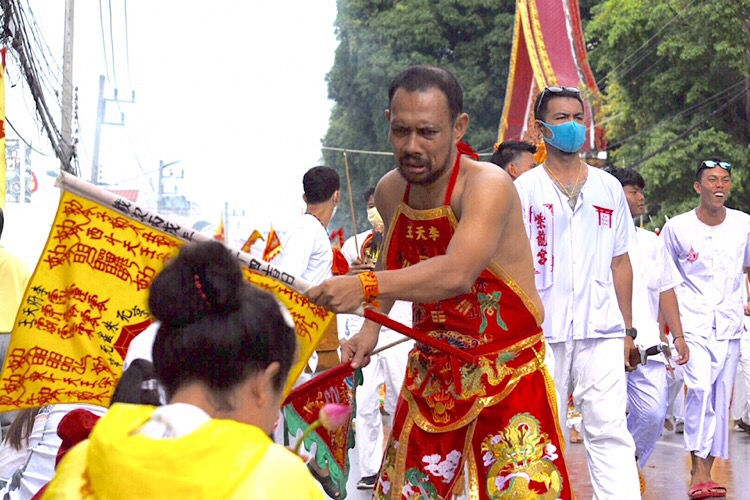
Masong (ม้าทรง) are the people who invite the spirits of gods to possess their bodies. Ma (ม้า) is the word for horse in Thai, and the name masong refers to how the spirits of the gods use the bodies of these people as a vehicle, as one rides a horse. Only pure, unmarried men or women without families of their own can become masong. At the temple they undergo a series of rituals to protect them for the duration of the festival, during which flagellation and self-mutilation is practiced. The masong tradition doesn't exist in China and is believed to have been adopted from the Indian festival of Thaipusam.
During the main ritual at the temples, the Ma Song fall into a trance and pierce their cheeks with ritual objects, including knives, spears, relics, and other items of personal significance. Then, the Ma Song demonstrate their submission by presenting their expressive forms of self-mutilation in a public procession.

Teams of people accompany the masong to keep their wounds clean and to help support the heavier piercings. It is believed that while they are possessed the masong will not feel any pain. They can also be seen shaking their heads back and forth continually, and usually do not seem to "see" their surroundings. At the temple during the festival there is also fire walking and blade-ladder climbing. While large crowds of people gather to watch, the entranced mah song distribute blessed candy and pieces of orange cloth with Chinese characters printed on them yan (ยันต์ )for good luck.

TIPS if you want to see this festival:
1. Know the dates, and the schedule of events. Locals would often know but foreigners can get the details from local news websites such as The Phuket News or Thaiger Phuket events section or the Phuket Vegetarian Festival website. They publish the information weeks before the festival. There's also an ebook available where you can see the route of the parade and the shrines where the rituals are happening.
2. Plan early. Once you know the routes of the procession and location of the shrine, plan to go there an hour before or earlier depending on where you are staying. Roads will be blocked and expect detours and limited parking spaces. If you're an early bird, you avoid the heavy traffic, can park closer to the venue AND get the best spot for photography. This will also help you plan where to book your hotel.
3. Be patient. Rituals don't really start at the time mentioned or announced. We arrived at 8pm for the fire walking ceremony at Bang Liao Shrine. There were so many people already, you could barely go to the area where they were burning heaps of coal that's why I wasn't able to take pictures of the Ma Songs walking on burning coals. The fire walking happened at about 9:30 pm. That's more than an hour of waiting but if you come late, you won't be able to see it happening as well. So come early but expect to wait.
4. Hydrate. Processions and shrine events could take time. Bring your own water bottles or buy before going. Lots of people. You will sweat whether the weather is good or not.
5. Prepare for rain. October is already the rainy season in Thailand. Bring an umbrella, a raincoat, or a hat/cap in your handydandy backpack.
6. Beware of the flying firecrackers. As mentioned, firecrackers are thrown anywhere during the procession so be on the look out. They do not throw it on the spectators but can be on the roadside or corners of shops or houses they are invited to bless. Sometimes, soot or burning papers can be blown by the wind as well so be extra cautious.
7. Bring a face mask. The smoke from all the incense and firecrackers as well as the burning coal (if you are going to watch the fire walking ceremony) could get too thick and could sting your eyes especially if there is no wind or if it is too humid. The smoke and fumes could trigger allergies and asthma.
8. Do not bring your children if you do not want them to see bloody, pierced people or self-mutilating rituals. It can be very terrifying even for adults like me. Some things, you cannot unsee. Local children are accustomed to it because it is part of their culture. If you are taking them, brief them on what they may see and explain the significance of this festival for the devotees so they also learn, if not to appreciate, but to respect others' culture/belief.
9. Be open minded. Their practices maybe different but it is part of their tradition / culture. We all can learn something from our differences.
In general, it's a very interesting festival to see and I admire the devotees for their faith and dedication. My family enjoyed witnessing this unique festival. Will I ever want to see it again next year? OF COURSE. :)
#travel #phuketvegetarianfestival #phuket #thailand #vegetarianfestival #tips #photography #travelphotography #amazingthailand



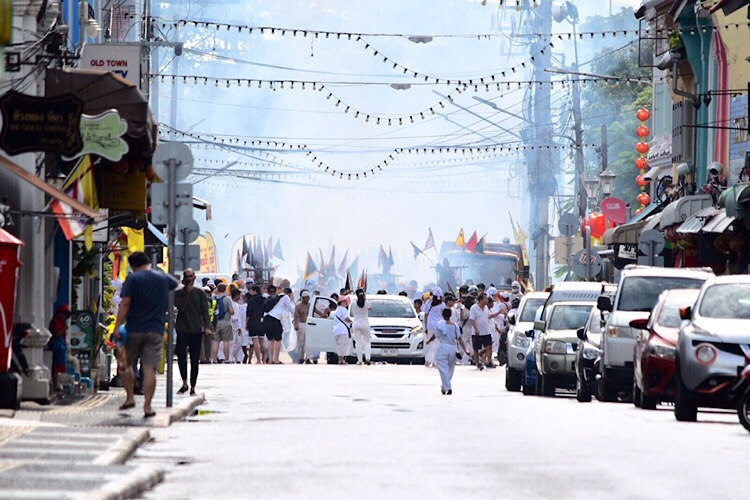

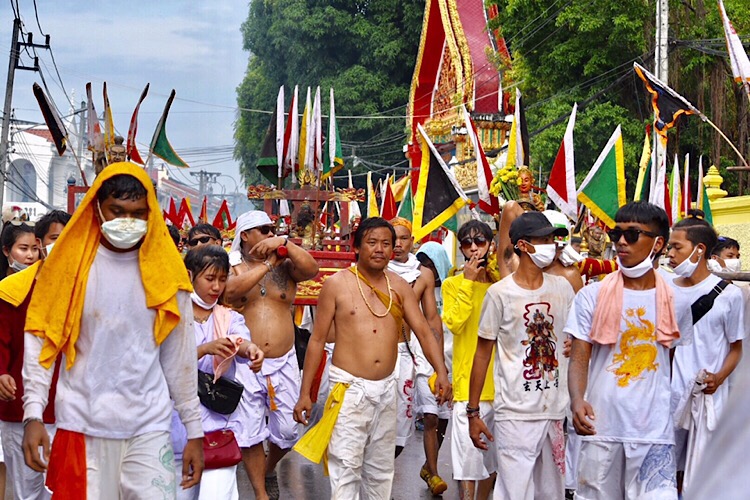

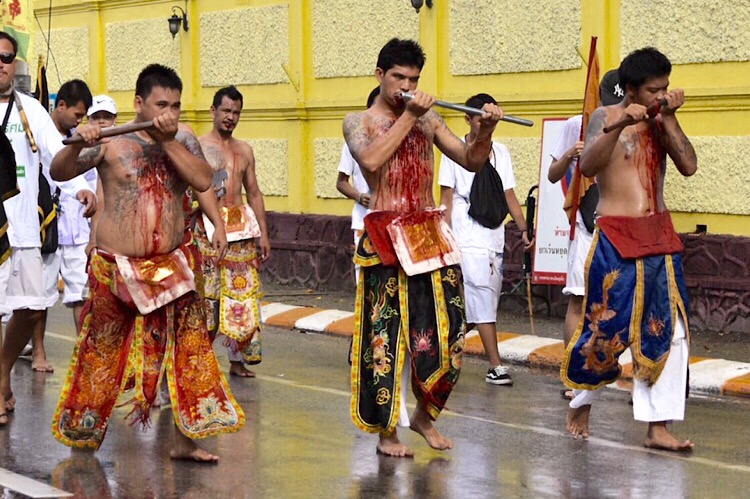

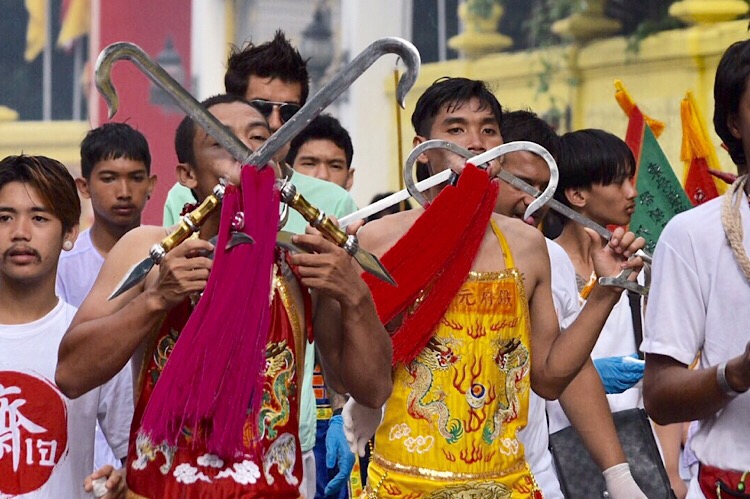

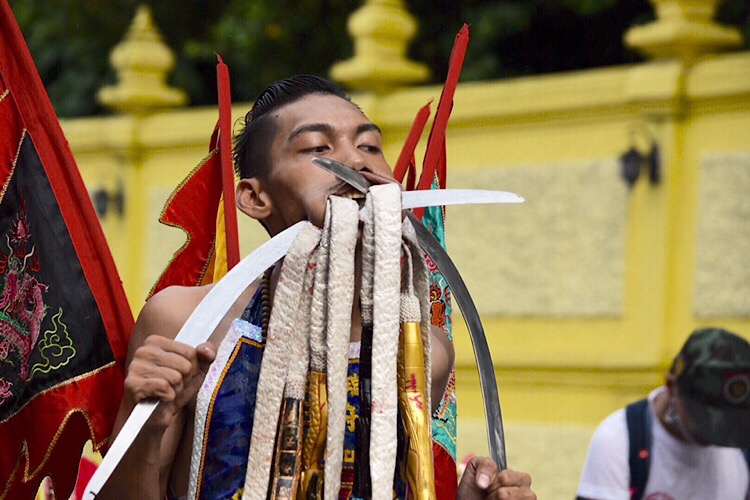





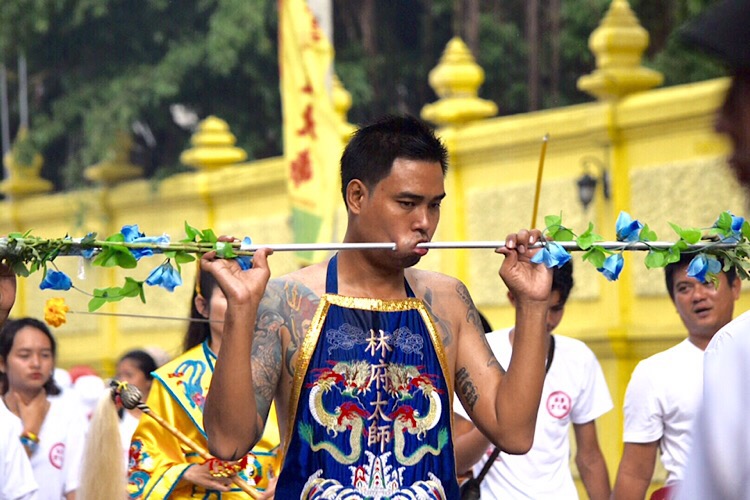



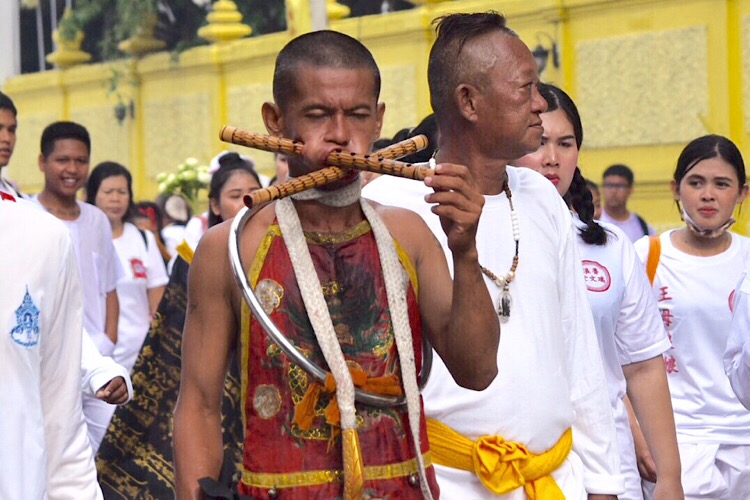







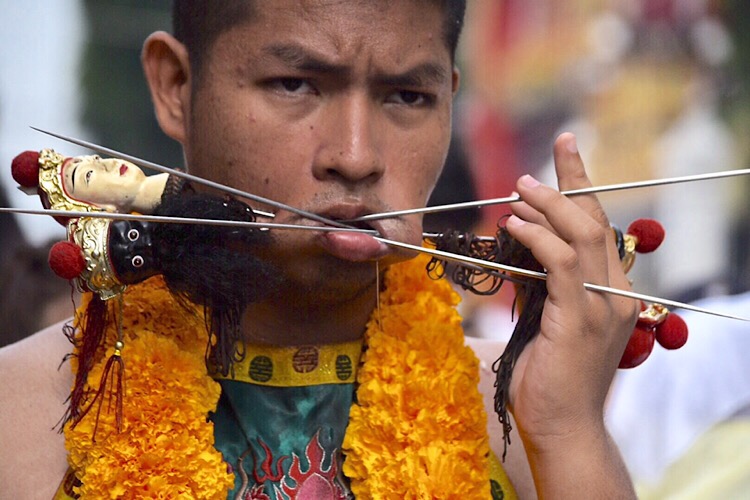

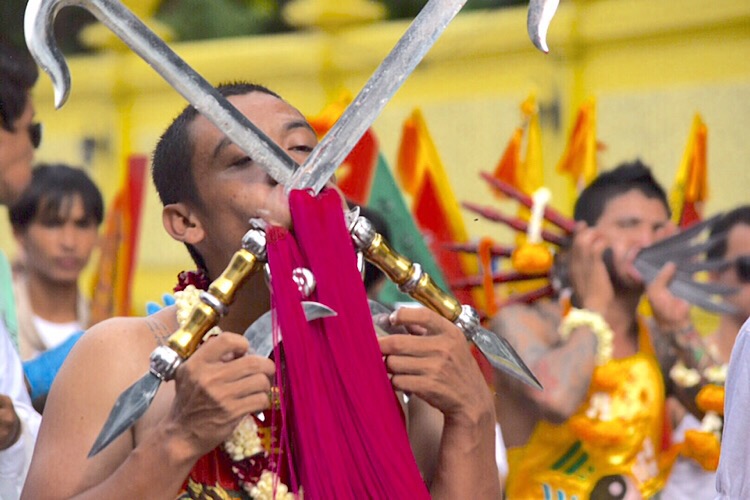

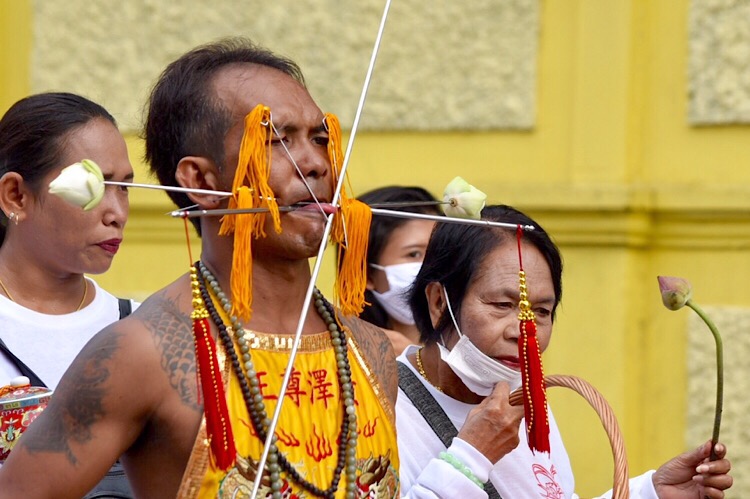

Comentários